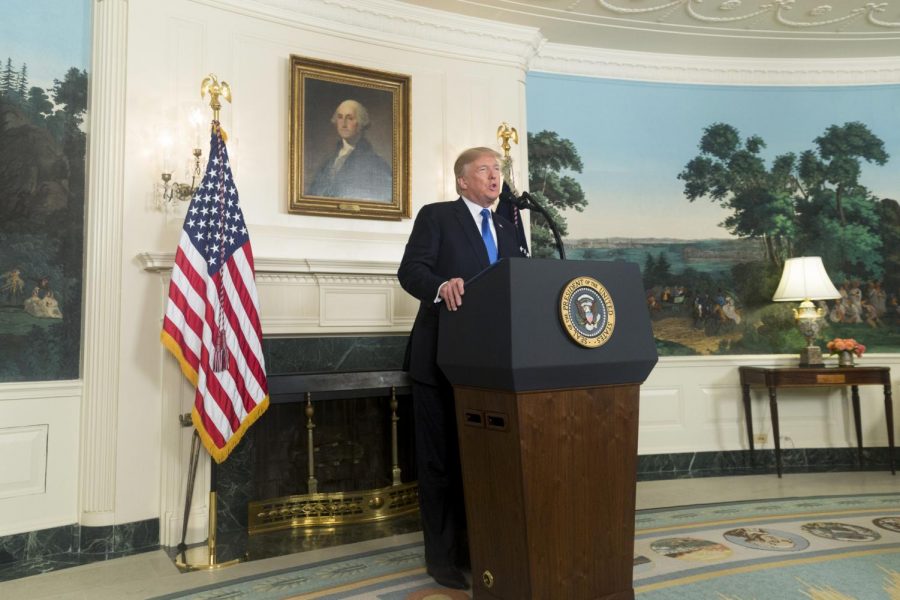Donald Trump’s Bad Deal
May 23, 2018
Donald Trump loves to rail against “bad deals.” Of course, these bad deals are never negotiated by him—after all, he’s the best businessman in the world, right? Of all the bad deals he’s gone on tirades about, perhaps the most prominent ones are the North American Free Trade Agreement (NAFTA)—which he famously referred to as “the worst trade deal in the history of trade deals”—and the Iran Nuclear Deal. Negotiations on the former are occurring this very minute, and for a time, it looked like Trump would be swayed by the forces of reason and allow the United States to remain part of the Iran Nuclear Deal, formally known as the Joint Comprehensive Plan of Action (JCPOA). As of May 8th, however, the US has withdrawn from the agreement and also reimposed economic sanctions on Iran, continuing the US’s retreat from the world stage and setting the stage for even more instability in the Middle East.
Trump has railed against the Iran Nuclear Deal ever since he entered the presidential race in 2015, though this stance wasn’t dissimilar to that of other prominent Republicans; indeed, at that time, Mitch McConnell, according to ABC News, dismissed it as “flawed,” and Jeb Bush referred to it as “dangerous, deeply flawed, and short-sighted,” according to NBC News. This viewpoint was and is certainly reasonable, at least politically. After all, according to a BBC poll conducted five years ago, a staggering 87% of Americans view Iran negatively.
At some point, though, I have to wonder how many Americans truly understand the implications of the JCPOA, and indeed, how many Americans can support their negative opinion of Iran with evidence. That isn’t to say that reasons don’t exist for disliking Iran. Off the top of my head, I can think of multiple rationales, including—but not limited to—Iran’s support of militant Islamic groups and terrorist organizations like Hezbollah; Iran’s cynical propping-up of the autocratic Assad regime in Syria, a side effect of its continuous quest to spread its hegemony throughout the Middle East; Iran’s continued tests of ballistic missiles, a show of its belligerence; and the actions of Iran’s oppressive regime, which regularly violates basic human rights. I’m never quite sure, however, if Americans are aware of these facts and can use them to justify their opinion of Iran or simply perceive Iran negatively because of political buzzwords like “an Axis of Evil.”
In any case, it’s critical for us to understand the JCPOA and its original intentions. Critically, the JCPOA isn’t a bilateral deal between the US and Iran; the UK, France, China, Russia, and Germany are also parties to it. In fact, the week before Trump pulled out of the deal, leaders from these very nations visited the White House in hopes of convincing Trump to remain part of the deal. According to the BBC, the JCPOA called for a 98% reduction in Iran’s existing uranium stockpile and a halt to uranium enrichment until 2031, since enriched uranium can be used to both generate nuclear power and create nuclear weapons. Additionally, it limited Iran’s use of its existing nuclear reactor and allowed inspectors from the International Atomic Energy Agency to continuously monitor and periodically inspect Iran’s existing nuclear facilities to ensure that Iran adheres to the JCPOA. In exchange, the other parties involved in the JCPOA—namely the US, the EU, and the UN—lifted many economic sanctions, giving Iran access to previously-frozen overseas assets and the international trade of vital resources like oil. Importantly, there is currently no evidence that Iran has violated any part of the JCPOA. Inspectors from the International Atomic Energy Agency have found that Iran has continuously complied with the terms of the agreement.
For most policymakers, the main concern with the JCPOA was—and is—the timelines included in the deal, also known as “sunset clauses.” By 2031, the majority of the stipulations on Iran’s nuclear activities will have expired, opening the door to a potential continuation of Iran’s nuclear activities and thus the clandestine acquisition of nuclear weapons. Indeed, Trump’s former Secretary of State, Rex Tillerson, declared that “one can almost set the countdown clock to when Iran can resume its nuclear weapons programs, its nuclear activities.” Many policymakers, however, also agreed that a deal with a timeline was better than no deal at all.
Trump’s attacks against the JCPOA have logically been concentrated on the existence of these sunset clauses. However, at times, his rationale for backing out of the JCPOA seems much pettier. While announcing the U.S.’s exit from the JCPOA, Trump jabbed at former Secretary of State John Kerry’s attempts to engage with foreign leaders on the issue of the JCPOA, referring to them as “possibly illegal shadow diplomacy.” According to CNBC, though, since Kerry was one of the chief negotiators at the summit which created the JCPOA, such measures were perfectly legal. Such petty, immature declarations imply that Trump wishes to withdraw from the JCPOA simply because he feels his authority has been somehow undermined by its very existence.
Our departure from the JCPOA is dangerous for a myriad of reasons. Although Iran has no plans to leave the JCPOA at this time, since the other parties to the deal have chosen to remain, there’s no telling whether that might change in the future. The existence of the “sunset clauses” might not be optimal, but our world would become rapidly less secure if Iran were to reembark on the process of procuring nuclear weapons in the near future as opposed to the distant one. Additionally, our exit from the JCPOA further isolates us at a time when an interconnected world is more important than ever before.
A final potential impact is less direct yet no less alarming. At a time when North Korea continuously flouts the mountain of sanctions levied on it, the belief that economic sanctions are toothless prevails. The sanctions levied on Iran, however, undoubtedly hurt its economy. Although the sanctions obviously didn’t lead to the total collapse of the Iranian state, Iran’s economy continuously contracted from the impact of the sanctions. According to The Washington Post, when the JCPOA was signed and these sanctions were removed, Iran’s economy began to grow again, expanding at a rate of 13.4% during 2016 alone. Iran’s economy, however, is still quite volatile, and the reimposition of sanctions by the Trump administration could lead to a more unstable Iran. Why would this matter? It might seem strange, but the current Iranian government is considered moderate, and even fairly liberal. A weakened Iran—and an angrier, more frustrated populace—could open the doors for an even more radical, anti-Western administration.
Trump might wholeheartedly believe that choosing to exit from the JCPOA will help both the U.S. and the world. This choice, however, could actually be the worst deal that Trump has ever bargained for.

















































































































































